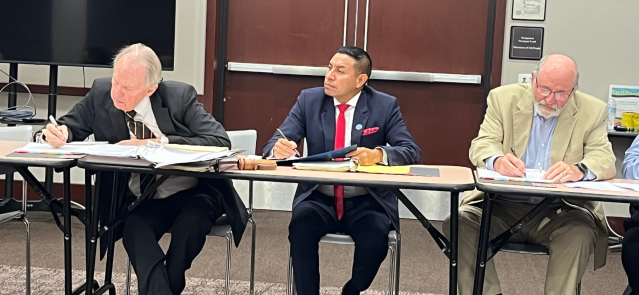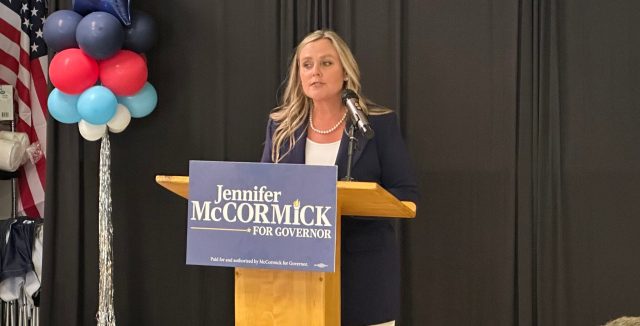Stay ahead of the curve as a political insider with deep policy analysis, daily briefings and policy-shaping tools.
Request a DemoArizona Electric Utilities Set New Records for Peak Energy Demand
Pima Animal Care Center holds Mega Adoption Event August 10 and 11
Governor Tim Walz is the Unapologetic Progressive Champion Voters Deserve as their Vice Presidential Nominee
- Free breakfast and lunch for students
- Funding Public Transit
- Raising Corporate Taxes
- 3 Months of Paid Sick Leave
- Passed recreational Marijuana
- Passed Universal background checks for guns
- Implemented tuition-free college for low-income families
Plan for weekend I-17 northbound closure in north Valley
- Stay on the detour route regardless of what a navigation app may suggest. This is the best way to reduce delays for yourself and others. Avoid attempting to detour on local streets, which are not designed for large traffic volumes.
- ADOT will be placing local-only closures at neighborhood entrances on a number of streets near I-17 to help direct detour traffic away from local roadways. Law enforcement officers will be stationed at intersections throughout the area to assist with traffic flow.
- Lengthy traffic backups are unavoidable during freeway closures like this one, so drivers should plan ahead. Those with weekend plans to use northbound I-17 through the north Valley can consider traveling before Friday night’s closure begins. Traffic on northbound I-17 also generally is lighter during the early morning hours or later at night and is expected to be especially busy on Saturday and Sunday afternoons.
Hatathlie, Miranda condemn the transportation of uranium through the Navajo Nation
NCSL: Experts say start building 2030 redistricting checklist now
The next redistricting cycle is several years away, but those involved with various states’ processes on Wednesday implored lawmakers to begin preparing now.
Their message was delivered at a National Conference of State Legislatures summit session intended to preempt challenges states may face when it comes to inmate data reallocation, commissions, map criteria, public input and remedial mapmaking.
Karin Mac Donald, director of the California Statewide Database, said that when it comes to inmate data reallocation — the process of adjusting the residency record of inmates — “start early and make a plan.”
California’s process took several years and required collaboration between her office, lawmakers, the department of corrections and the Census Bureau.
She advised thinking about whether new legislation is required, if technical changes are needed, and whether the funding, software, staff or training is in place to execute the process.
She also suggested becoming familiar with the data sets and securing a test file from the department of corrections in advance to learn how to clean addresses manually or with the help of software tools, set thresholds for minimum acceptable level of confidences and more.
Jonathan Cervas, an assistant teaching professor at Carnegie Mellon Institute for Strategy and Technology, said states also need to think about who is making their maps.
While most states enact maps through their legislatures, some use commissions that can include legislators, citizens or both and whose maps may or may not require legislative approval. Membership across the country ranges from four members to 16.
Continue reading “NCSL: Experts say start building 2030 redistricting checklist now”NCSL: Experts say start building 2030 redistricting checklist now
The next redistricting cycle is several years away, but those involved with various states’ processes on Wednesday implored lawmakers to begin preparing now.
Their message was delivered at a National Conference of State Legislatures summit session intended to preempt challenges states may face when it comes to inmate data reallocation, commissions, map criteria, public input and remedial mapmaking.
Karin Mac Donald, director of the California Statewide Database, said that when it comes to inmate data reallocation — the process of adjusting the residency record of inmates — “start early and make a plan.”
California’s process took several years and required collaboration between her office, lawmakers, the department of corrections and the Census Bureau.
She advised thinking about whether new legislation is required, if technical changes are needed, and whether the funding, software, staff or training is in place to execute the process.
She also suggested becoming familiar with the data sets and securing a test file from the department of corrections in advance to learn how to clean addresses manually or with the help of software tools, set thresholds for minimum acceptable level of confidences and more.
Jonathan Cervas, an assistant teaching professor at Carnegie Mellon Institute for Strategy and Technology, said states also need to think about who is making their maps.
While most states enact maps through their legislatures, some use commissions that can include legislators, citizens or both and whose maps may or may not require legislative approval. Membership across the country ranges from four members to 16.
Arizona’s commission consists of four citizens appointed by legislators and a fifth citizen commission chair who may not be a member of either major political party. Its maps become law without legislative intervention, Cervas said.
In developing the commissions, Cervas said several items need to be considered including the number of members, whether that number is odd or even, how maps are approved, the level of involvement by the legislature, and the overriding criteria for developing a map.
There are also the “functional problems,” he said, like how commissions are budgeted, how staff are hired, how long it should exist, and how members are compensated.
“I don’t think anyone has a good answer on the proper way to construct a commission,” he said.
Because each state operates so differently, Cervas said there is not a reliable study on best practices as it is difficult to pinpoint which aspects of each plan works best.
Still, he said, citizen commissions are “seen as the gold standard if your goal is to take politics out of it.”
Helen Brewer, an NCSL policy specialist, said states must determine not only the criteria by which they draw maps, but also how those criteria rank.
Michigan, for example, requires contiguity above all, followed by preservation of communities of interest, avoiding intentionally favoring a political party, avoiding intentionally favoring an incumbent or candidate, preserving political subdivisions, and lastly, compactness.
In contrast, Missouri prioritizes compactness first, followed by contiguity, preservation of political subdivisions, proportionality and competitiveness.
They are among five states that rank criteria either in statute or in the constitution, while others set criteria more informally.
Brewer said a strict ranking provides map makers with clear instructions, but cautioned that “mapmakers are dealing with infinite and sometimes conflicting data points, so they may need more flexibility.”
Quyen Do, deputy research director of the Oklahoma legislature, said her state implemented several measures to facilitate public input.
Some were “low-hanging fruit,” like setting up an email and dedicated website with an online feedback form.
Others required more planning, like holding 30 regional town halls that were recorded and live streamed, providing public training on how to use Dave’s Redistricting and allowing public map submissions.
Lawmakers should also consider whether hearings are held before or after draft maps are created and how public input is collected, stored, collated and reviewed, she said.
Jeff Wice, special counsel for the New York legislature, explained that remedial mapmaking occurs when there is a legislative impasse, if a commission implodes, as was the case in New York and Virginia, or if a court finds a violation and requires a new map.
In those situations, a court may hire a “special master” to take the lead in drawing remedial maps, he said.
NCSL advised states to consider whether political parties may submit nominees for the special masters, what rules they must follow, whether states or redistricting commissions will have to provide staffing and facilities for remedial processes and whether they will have to cover the cost of remedial mapmaking.
Krista Kano is a staff writer for Gongwer Ohio/State Affairs. Reach her at [email protected] or on X @krista_kano.
Recount Commission confirms Steuerwald, King primary wins
The Indiana State Recount Commission certified on Wednesday the May primary victories by Republican state Reps. Greg Steuerwald of Avon and Joanna King of Middlebury.
The tallies following the State Board of Accounts review of ballots resulted in little or no change from the preliminary vote totals showing Steuerwald and King winning with nearly two-thirds support.
A partial recount of House District 40 in Hendricks County found no disputed or invalid ballots, said Kendra Leatherman, general counsel for the Board of Accounts.
That resulted in the Recount Commission voting to confirm Steuerwald’s 3,519-2,050 victory over challenger Brian Paasch.
About 40 disputed ballots were found in the recount of House District 49 in Elkhart County, where King prevailed over challenger Cindi Hajicek.
But Hajicek’s attorney, Michelle Harter, withdrew most of those disputes. Harter said those ballots were largely challenged because they lacked the required initials from two poll clerks and that one vote center was particularly “sloppy” in following the procedures.
“It looks like the ballots disputed with the initials from this vote center were for both candidates, so there’s no evidence of tampering to benefit one candidate over the other,” Harter told the commission.
The recount tally gave King 3,803 votes to Hajicek’s 2,049 votes. The preliminary tally had shown King winning 3,805-2,047.
Samantha DeWester, the attorney representing Steuerwald and King, criticized the recounts being sought and the three-month delay they caused in the primary results being finalized.
DeWester said the bond money that Hajicek and Paasch had to post should go toward covering the expenses of state and county workers assigned to the recounts.
“I’m still scratching my head at both of these recounts that were won by nearly 30 points in both of them,” DeWester said. “The taxpayers now have spent three months waiting on finality for and have funded the recount.”
Republican Secretary of State Diego Morales — the Recount Commission chair — and Democratic member Michael Claytor voted to deny any bond refunds to Hajicek and Paasch. Republican commission member Mark Wynn was absent.
Those bonds totaled $2,600 for Hajicek as she sought a full recount and $100 from Paasch for the partial recount he requested, according to Election Division Co-Director Brad King.
The bond retention was required under state law because the recount did not sufficiently change the final tallies.
Harter, who represented both Hajicek and Paasch, said her clients had concerns about issues such as the ballots not being properly handled by poll workers.
“There were some things that were suspicious with the reporting of numbers,” Harter told State Affairs after the meeting. “This process doesn’t ameliorate all the concerns that they had.”
Tom Davies is a Statehouse reporter for State Affairs Pro Indiana. Reach him at [email protected] or on X at @TomDaviesIND.
McCormick teases property tax plan that considers impact on local governments
Democratic gubernatorial nominee Jennifer McCormick told Indianapolis radio show hosts Wednesday that her property tax relief plan will consider possible impacts on local units of government.
Speaking with Rob Kendall and Casey Daniels, hosts of WIBC-FM’s “Kendall and Casey” program, McCormick said, “We cannot look at property taxes in isolation. Our taxing system is complex, and so it needs to be reviewed all at once.”
McCormick’s comments come after U.S. Sen. Mike Braun, the state’s Republican gubernatorial nominee, and Donald Rainwater, the Libertarian candidate, proposed their own property tax relief plans. McCormick has yet to release a property tax relief plan but says it’s coming.
“Here’s what I won’t do: I won’t lie to Hoosiers and say we can cut it all without options of revenue, because our towns, our cities, our schools, our libraries cannot survive if we just start cutting taxes with no revenue replacement ideas,” McCormick told the hosts.
McCormick supports medical marijuana as a new revenue stream: “It’s time we have a well-regulated industry, start with medical [marijuana], learn from states around us … and then look at rolling into recreational.”
Her plan, she said, will also factor in the wishes of the Indiana General Assembly, whose State and Local Tax Review Task Force continues to examine the state and local tax structure, including property taxes, ahead of the new legislative session.
“I think it would be irresponsible of anyone who would be looking at that governor’s position to ignore the legislative body because, obviously, they are going to play a huge role in this,” McCormick said. “Being committed to working with everyone regarding this problem is the best way to approach it.”
Yet McCormick criticized Republicans’ handling of Hoosiers’ increased property tax bills: “If they really wanted to fix it, as a party, they would have already fixed it.”
McCormick, once a Republican, broke from the party because it, in her estimation, lacked fiscal responsibility, transparency, accountability and an “appetite for local control.”
The final state superintendent of public instruction, McCormick said she is particularly cognizant of the impact property tax cuts would have on schools. McCormick said an overreliance on referendums, at the direction of Republican leadership, has risked creating a system of “haves and have-nots” and has put some local communities in a difficult position.
“That is what has been incentivized to our local [school] districts regarding what do you do if you can’t fund teachers, or what do you do if your roof is leaking and your property tax caps — your circuit breaker — [have] maxed you out,” McCormick said of Republican leadership’s guidance. “Their 100% answer to that is, every single time — ask any local superintendent — ‘Run a referendum.’”
She proposed bolstering the school funding formula so that fewer districts are forced to go to referendum to meet their needs.
Braun recently revised his property tax relief plan so that “all Hoosier homeowners’ tax bills will be reset to the lower of their 2021 tax bill” or a new bill with greater homestead deductions. (Total property tax bills on owner-occupied homes increased statewide by 9% in 2021, 9.2% in 2022 and 16.7% in 2023, according to a Legislative Services Agency report.)
Braun’s campaign has not released calculations on how much his proposal would reduce property tax collections or addressed possible replacements for potentially hundreds of millions in revenue declines for public school districts and local governments, which receive more than 90% of property tax revenue.
Rainwater has proposed capping property taxes at 1% of a property’s purchase price for a maximum of seven years. He said his plan would end “perpetual property taxes.” Griffin Reid, the Indiana GOP’s communications director, has argued Rainwater’s plan would front-load Hoosiers’ property tax payments in the first seven years. Reid has called Rainwater’s plan “unrealistic” and said it would “destroy the housing market.”
During the Wednesday interview, McCormick also lambasted Republicans for their education policies, especially their support of vouchers, which she argued takes money away from public schools.
The democratic candidate added she fears Republicans could end access to birth control “if extremism takes over the statehouse.”
Pressed to pinpoint when in a pregnancy an abortion should no longer be allowed, McCormick told the hosts: “There’s no magic time of that, right, because when you look at what’s happening in a pregnancy no one says at 10 weeks that’s the magic time when you should be making a decision. Things happen. Especially in incest and rape — how Indiana has made it so restricted — that when you get to that point, many people don’t even know they are pregnant.”
Contact Jarred Meeks on X @jarredsmeeks or email him at [email protected].



